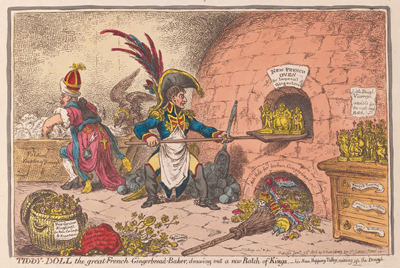Tiddy Doll, the Great French Gingerbread-Baker, Drawing out a new Batch of Kings
Tiddy Doll was the trade name of an itinerant gingerbread baker (real name Ford) well remembered in London for selling his biscuits at public events such as fairs and markets or wherever crowds gathered. Although he died in 1752, he had been immortalized in Hogarth's "The Idle Prentice Executed at Tyburn" (1747) where he appears (naturally) hawking his wares. His sales patter included the nonsense refrain of "ti-ti, tid-dy ti-ddy, dol." which gave him his name.

[January 23, 1806]
© Beinecke Rare Book and Manuscript Library, Yale University
Gillray capitalizes on the gingerbread baker's enduring fame to portray Napoleon Buonaparte as a modern day Tiddy Doll, manufacturing European leaders as quickly and easily as gingerbread men. The print was likely inspired by the bad news from Dutch and French newspapers summarized by the Morning Chronicle on January 17th, a week before Gillray's print appeared. There the news of Buonaparte's victory at Austerlitz over the combined armies of Austria and Russia was reported as definitive and the first rumors of the humiliating terms of what was to become the Treaty of Pressburg were sketched. Not only do several of the specific details of the print seem to derive from article, but even more importantly, we find the idea of Buonaparte as "King-maker."
The Dutch and French papers, which have arrived, contain intelligence of considerable importance. The conclusion of peace between France and Austria is certain, and there can be no doubt that it is definitive. . . . The 37th Bulletin annnounces that both Bavaria and Wirtemberg are to be Kings. The Elector of Wirtemberg is to be King Suabia. . . .This is a transformation. The Child and Champion of Jacobinism into the King-maker! It is understood, however, that Austria is to receive something in the East, which must be at the expence of Turkey. We should not be surprized, however, if likewise she were to get back Silesia [i.e. Poland], while Bonaparte would indemnify Prussia by giving her Hanover. Austria does not now retain a foot of territory on the German side of the Inn.
By the arrangements which have taken place the German Constitution is abolished. Austria is thrust out of Europe, and those barriers, [which] hitherto deemed so formidable, are now in the hands of her enemies. She can hardly ever now carry on an offensive war against France. All the indemnities she can receive in the East cannot restore her political importance. She can scarcely be considered a principal power in Europe.
As suggested in the article, Gillray shows Buonaparte making Kings, drawing out a freshly baked set for Bavaria, Wirtemberg, and Baden from his "New French Oven for Imperial Gingerbread." The oven is appropriately fueled by a mound of cannonballs, representing his recent military triumphs (at Ulm, and especially at Austerlitz), but also recalling that he had first distinguished himself as a military officer (and continued to do so) by his expertise in artillery).
Beneath the open mouth of the oven is the "Ash Hole for broken Gingerbread," in front of which is the "Corsican Besom [i.e. Broom] of Destruction" Among the countries that have been swept to destruction by the Corsican-born Buonaparte are Spain, Italy, Switzerland, Holland, and now Austria But we can also see the tri-color flag and bonnet-rouge of the French Revolution which Buonaparte had betrayed by the coup of 1799.
Napoleon is assisted in his work by the club-footed "Hopping Talley" (Talleyrand) his wily strategist and foreign minister, who is shown standing before a "Political Kneading Trough" where he prepares the dough for future Kings. Countries in the mix include Hungary, Poland, and Turkey. Meanwhile, as the Morning Chronicle suggests, Hanover is being turned over to the Prussian Eagle. Talleyrand had been a Catholic Bishop of Autun earlier in his career, so he is shown wearing bishop's robes and mitre, with a rosary hanging from his belt. He was also Napoleon's chief negotiator of treaties (including Pressburg) so he is also shown with quills and ink.
Next to the oven is a chest with drawers labeled "Kings & Queens," "Crowns & Sceptres," and "Suns & Moons." On top of the chest, according to the note pinned on the wall, are "Little Dough Viceroys intended for the next new Batch." They include English Whigs to be rewarded (presumably) for their pro-French stance since the revolution: Richard Brinsley Sheridan, Charles James Fox, Sir Francis Burdett (behind Fox), Lord Moira, George Tierney, and Lord Derby.
Finally, in the far left foreground, we see a basket full of Napoleon's relatives, "True Corsican Kinglings" fully baked and ready "for Home Consumption and Exportation." And though this is NOT mentioned in the article, Gillray correctly predicted that Napoleon's growing paranoia would eventually lead him more and more frequently to select the future rulers of his conquests from among his own extended family.
Sources and Reading
- Commentary from the British Museum on Tiddy Doll, the Great French Gingerbread-Baker, Drawing out a new Batch of Kings.
- Tim Clayton & Sheila O'Connell, Bonaparte and the British, 2015, #101, p. 162.
- Draper Hill, Mr. Gillray The Caricaturist, 1965, p. 131, Pl. 105
- Draper Hill, Fashionable Contrasts, 1966, #41
- "Napoleon," Wikipedia
- "Charles Maurice de Talleyrand-Périgord," Wikipedia
- "Mayfair.—Tiddy Doll, the Gingerbread Seller," The Gentleman's Magazine March 1816
- "War of the Third Coalition," Wikipedia
- "Peace of Pressburg (1805)," Wikipedia
- Thomas Wright and R.H. Evans, Historical and Descriptive Account of the Caricatures of James Gillray #309
- Thomas Wright and Joseph Grego, The Works of James Gillray, the Caricaturist; With the History of His Life and Times
Comments & Corrections
NOTE: Comments and/or corrections are always appreciated. To make that easier, I have included a form below that you can use. I promise never to share any of the info provided without your express permission.